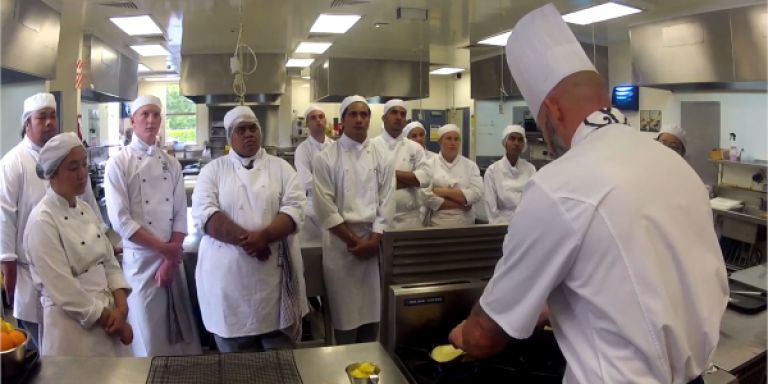Programme highlights
Take your culinary career to the next level and become a chef with the skills to plan a menu and lead a team in a professional kitchen.
Develop your understanding of restaurant management by learning how to plan, develop and cost menus, and manage staff.
Learn how to source the best ingredients to produce world-class dishes and test out your hands-on skills in our purpose-built kitchen.
You will also get real-world experience on work placements in restaurants.
With the industry adapting, this qualification and experience can help you to stand out and be in higher demand for roles as a qualified chef in a restaurant, hotel or the catering and events industry.
Entry requirements
Entry requirements general
Applicants must meet the following criteria for admission into the programme:
- Successful completion of NZ2101 (New Zealand Certificate in Cookery Level 4); or
- Equivalent to the above
Students who have not attained the age of 20 years and do not hold the required minimum entry requirements for a programme may also be eligible to enrol in exceptional circumstances.
Such decisions will be made by the Head of Hospitality and Tourism.
English language entry requirements
You will need English language competence to undertake this programme which is taught and assessed in English (an assessment may be required if your first language is not English).
Special & discretionary admission
Any ākonga who is 20 years of age or older and has not reached the general admission requirements for their intended programme is eligible for Special Admission. Te Pūkenga works with the ākonga to ensure they are prepared for their intended programme. Any ākonga who is not yet 20 years of age and has not reached the general admission requirements for their intended programme may be eligible for Discretionary Admission. In assessing whether to grant Discretionary Admission, the delegated authority focuses on the applicant’s level of preparedness for their intended programme.
Give yourself credit with Recognition of Prior Learning (RPL)
Did you know you can use the knowledge and experience you already have to your advantage?
Your previous work experience and on-the-job skills, volunteering, professional development, and other providers’ qualifications can be recognised as prior learning, matched against credits in our courses, and put towards your qualification – potentially saving you money and possibly helping you to complete your qualification faster Learn more.
Programme structure
You will need to complete the below eight courses (120 credits):
461.533 Concepts of menu planning (15 credits)
461.534 Applied menu planning concepts (15 credits)
461.535 Hospitality business concepts (15 credits)
461.536 Applied hospitality business concepts (15 credits)
461.537 Professional kitchen management (15 credits)
461.538 Applied professional kitchen management (15 credits)
461.539 Culinary staff management (15 credits)
461.540 Applied culinary staff management (15 credits)
Do you want to study a single course, without enrolling into the full programme?
Courses within some of our programmes may be offered as an individual Certificate of Proficiency (COP). Programme entry requirements and course fees apply. For more information, please speak to our friendly Ask Me! team.
Career opportunities
Qualified chefs, highly sought after by industry. For potential salaries visit careers.govt.nz.













